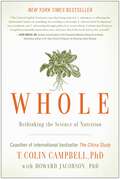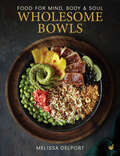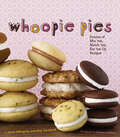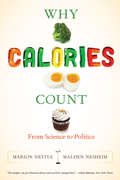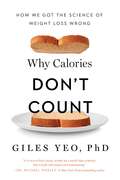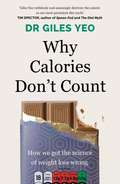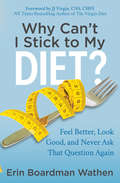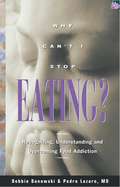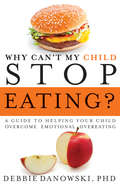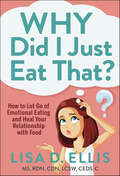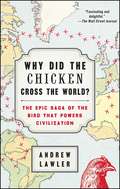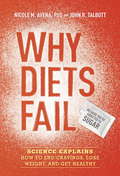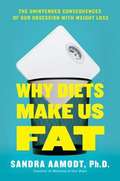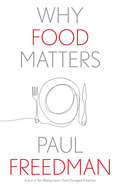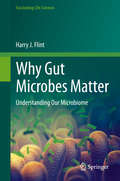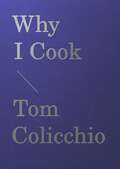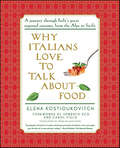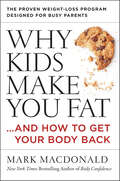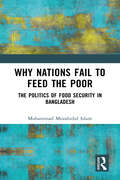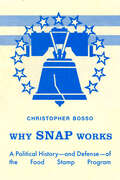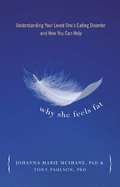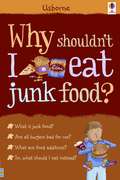- Table View
- List View
Whole: Rethinking the Science of Nutrition
by T. Colin Campbell Howard JacobsonNew York Times Bestseller What happens when you eat an apple? The answer is vastly more complex than you imagine. Every apple contains thousands of antioxidants whose names, beyond a few like vitamin C, are unfamiliar to us, and each of these powerful chemicals has the potential to play an important role in supporting our health. They impact thousands upon thousands of metabolic reactions inside the human body. But calculating the specific influence of each of these chemicals isn't nearly sufficient to explain the effect of the apple as a whole. Because almost every chemical can affect every other chemical, there is an almost infinite number of possible biological consequences. And that's just from an apple. Nutritional science, long stuck in a reductionist mindset, is at the cusp of a revolution. The traditional &“gold standard" of nutrition research has been to study one chemical at a time in an attempt to determine its particular impact on the human body. These sorts of studies are helpful to food companies trying to prove there is a chemical in milk or pre-packaged dinners that is &“good" for us, but they provide little insight into the complexity of what actually happens in our bodies or how those chemicals contribute to our health. In The China Study, T. Colin Campbell (alongside his son, Thomas M. Campbell) revolutionized the way we think about our food with the evidence that a whole food, plant-based diet is the healthiest way to eat. Now, in Whole, he explains the science behind that evidence, the ways our current scientific paradigm ignores the fascinating complexity of the human body, and why, if we have such overwhelming evidence that everything we think we know about nutrition is wrong, our eating habits haven't changed. Whole is an eye-opening, paradigm-changing journey through cutting-edge thinking on nutrition, a scientific tour de force with powerful implications for our health and for our world.
Wholesome Bowls: Food for mind, body and soul
by Melissa DelportAll the whole food nourishment you need in one bowl! Wholesome Bowls are the delicious answer to eating mindfully and well.The nearly 90 recipes included in this book are packed with nourishment, providing healthy, balanced and easy meals in a bowl. Many of the recipes are vegan or vegetarian, or can easily be adapted to suit either lifestyle choice. But there is plenty for the meat-eater too, with the added bonus that not only does the food look inviting and uplifting for the soul, it&’s good for your body too. There are also snippets of information about some of the ingredients to inform your food choices and why eating fresh, whole foods will benefit you.Try Turkish Eggs with Spicy Sesame Drizzle for brunch, a Brussels Sprouts, Pear and Horseradish bowl for lunch, and a warming Roasted Celeriac and Mushroom soup or a Chicken Fajita bowl for dinner. For something sweet there's Vegan Sweet Potato and Chilli Brownie bowl or Spice Cake with Cashew Cream Cheese Frosting. Wholesome Bowls is all about healing your relationship with food. Food is not the enemy and neither is your body. Taking the time to get to know your body, treating it with respect and nourishing it with real, fresh food is the single most important thing you can do for yourself. Eating mindfully, cutting out processed foods and embracing the foods that fuel you and leave you feeling energized are all part of the journey to finding happiness with food.
Whoopie Pies: Dozens Of Mix `em, Match `em, Eat `em Up Recipes
by Amy Treadwell Sarah Billingsley“Their book delivers more than (marshmallow) fluff. Their recipes offer new ideas for mixing and matching flavors and fillings.” —Tasting TableIs it a cake? Is it a cookie? With such deliciously soft and sweet cream-filled snacks, does it matter? The Internet is abuzz with recipes and stories of whoopie pie folklore, while customers everywhere are descending on bakeries in droves demanding these delectable treats. This adorable volume—the only cookbook devoted entirely to whoopie pies—features more than 40 mix-and-match recipes, including the classic chocolate with marshmallow cream and a range of bright flavor combinations such as red velvet, green tea, pumpkin with a tangy cream cheese filling, and oatmeal with, yes, maple-bacon buttercream. With plenty of color photos and hand-drawn illustrations, dozens of DIY decorating instructions, fun facts and baking tips, Whoopie Pies will make a welcome addition to any baker’s bookshelf.“Authors Sarah Billingsley and Amy Treadwell provide you with all the tools necessary to whip up a batch (or two, or three . . . ) of a variety of whoopie pies that will pretty much guarantee your addiction to these retro treats.” —CookThatBook“Sarah Billingsley and Amy Treadwell give us a gourmet take on whoopie pies—without sacrificing any of the decadence or childlike delight!” —Errant Dreams“The book offers some general tidbits on making, storing and freezing whoopie pies as well as some fun facts . . . I was surprised at how easy these are to make and how tasty even my results were.” —EverythingMom
Why Calories Count: From Science to Politics (California Studies in Food and Culture #33)
by Marion Nestle Malden NesheimCalories--too few or too many--are the source of health problems affecting billions of people in today's globalized world. Although calories are essential to human health and survival, they cannot be seen, smelled, or tasted. They are also hard to understand. In Why Calories Count, Marion Nestle and Malden Nesheim explain in clear and accessible language what calories are and how they work, both biologically and politically. As they take readers through the issues that are fundamental to our understanding of diet and food, weight gain, loss, and obesity, Nestle and Nesheim sort through a great deal of the misinformation put forth by food manufacturers and diet program promoters. They elucidate the political stakes and show how federal and corporate policies have come together to create an "eat more" environment. Finally, having armed readers with the necessary information to interpret food labels, evaluate diet claims, and understand evidence as presented in popular media, the authors offer some candid advice: Get organized. Eat less. Eat better. Move more. Get political.
Why Calories Don't Count: How We Got the Science of Weight Loss Wrong
by Ph.D. Giles YeoA Cambridge obesity researcher upends everything we thought we knew about calories and calorie-counting.Calorie information is ubiquitous. On packaged food, restaurant menus, and online recipes we see authoritative numbers that tell us the calorie count of what we're about to consume. And we treat these numbers as gospel—counting, cutting, intermittently consuming and, if you believe some 'experts' out there, magically making them disappear. We all know, and governments advise, that losing weight is just a matter of burning more calories than we consume. But it's actually all wrong. In Why Calories Don't Count, Dr. Giles Yeo, an obesity researcher at Cambridge University, challenges the conventional model and demonstrates that all calories are not created equal. He addresses why popular diets succeed, at least in the short term, and why they ultimately fail, and what your environment has to do with your bodyweight. Once you understand that calories don't count, you can begin to make different decisions about how you choose to eat, learning what you really need to be counting instead. Practical, science-based and full of illuminating anecdotes, this is the most entertaining dietary advice you'll ever read.
Why Calories Don't Count: How we got the science of weight loss wrong
by Dr Giles Yeo'In this great read, Giles Yeo ruthlessly and amusingly destroys the calorie as our most persistent diet myth.' Tim Spector, author of Spoon-Fed and The Diet Myth'A tour de force by the wise and witty Professor Giles Yeo. As well as being one of the UK's foremost experts on the genetics of obesity, Professor Yeo knows how to tell a great story. After reading this brilliant book you will understand what the labels on food really tell us, and what they don't.' Michael Mosley, author of The Fast 800'Giles Yeo knows that when it comes to motivating us to make better food choices, a little understanding goes a long way. He writes with a gift for making the science of diet interesting and a knack for telling us just what we need to know, and not too much more. Here he takes on the demon calories, and shows us why we should neither fear them, nor worship them, and certainly not count them. It's a book that will help you not just to eat better, but to enjoy eating better. And that's got to be worth having on your kitchen shelf.' Hugh Fearnley-WhittingstallCalorie information is ubiquitous. On packaged food, restaurant menus and online recipes we see authoritative numbers that tell us the calorie count of what we're about to consume. And we treat these numbers as gospel; counting, cutting, intermittently consuming and, if you believe some 'experts' out there, magically making them disappear. We all know, and governments advise, that losing weight is just a matter of burning more calories than we consume.Here's the thing, however, that most people have no idea about. ALL of the calorie counts that you see everywhere today, are WRONG.In Why Calories Don't Count Dr Giles Yeo, obesity researcher at Cambridge University, challenges the conventional model and demonstrates that all calories are not created equal. He addresses why popular diets succeed, at least in the short term, and why they ultimately fail, and what your environment has to do with your bodyweight.Once you understand that calories don't count, you can begin to make different decisions about how you choose to eat, learning what you really need to be counting instead. Practical, science-based and full of illuminating anecdotes, this is the most entertaining dietary advice you'll ever read.
Why Calories Don't Count: How we got the science of weight loss wrong
by Giles Yeo'In this great read, Giles Yeo ruthlessly and amusingly destroys the calorie as our most persistent diet myth.' Tim Spector, author of Spoon-Fed and The Diet Myth'A tour de force by the wise and witty Professor Giles Yeo. As well as being one of the UK's foremost experts on the genetics of obesity, Professor Yeo knows how to tell a great story. After reading this brilliant book you will understand what the labels on food really tell us, and what they don't.' Michael Mosley, author of The Fast 800'Giles Yeo knows that when it comes to motivating us to make better food choices, a little understanding goes a long way. He writes with a gift for making the science of diet interesting and a knack for telling us just what we need to know, and not too much more. Here he takes on the demon calories, and shows us why we should neither fear them, nor worship them, and certainly not count them. It's a book that will help you not just to eat better, but to enjoy eating better. And that's got to be worth having on your kitchen shelf.' Hugh Fearnley-WhittingstallCalorie information is ubiquitous. On packaged food, restaurant menus and online recipes we see authoritative numbers that tell us the calorie count of what we're about to consume. And we treat these numbers as gospel; counting, cutting, intermittently consuming and, if you believe some 'experts' out there, magically making them disappear. We all know, and governments advise, that losing weight is just a matter of burning more calories than we consume.Here's the thing, however, that most people have no idea about. ALL of the calorie counts that you see everywhere today, are WRONG.In Why Calories Don't Count Dr Giles Yeo, obesity researcher at Cambridge University, challenges the conventional model and demonstrates that all calories are not created equal. He addresses why popular diets succeed, at least in the short term, and why they ultimately fail, and what your environment has to do with your bodyweight.Once you understand that calories don't count, you can begin to make different decisions about how you choose to eat, learning what you really need to be counting instead. Practical, science-based and full of illuminating anecdotes, this is the most entertaining dietary advice you'll ever read.
Why Can't I Stick to My Diet?: Feel Better, Look Good, and Never Ask That Question Again
by Erin Boardman WathenLearn a smarter way to resist temptation with this wise, witty guide to healthier eating habits! Falling off of our diets happens to the best of us—but it doesn&’t have to happen to you again. It isn&’t a moral issue or a matter of willpower. It&’s based on science, and there is a solution. In this book, you&’ll learn: Why diets are so hard to stick toWhat is preventing us from sticking to our dietsWhy not being on a diet is the most effective way to maintain weight lossHow to figure out a specialized food plan for the rest of your lifeHow to ditch the diet mentality for good As a holistic health coach, food addiction counselor, Spin teacher, and wellness blogger, Erin Boardman Wathen has both the professional and personal experience to guide you to a better way, in a book that combines self-deprecating wit and the tough love of a good girlfriend. She will finally explain why those donuts are calling your name at the morning staff meeting—and why you need to tell them &“Not today, little balls of Satan!&”
Why Can't I Stop Eating: Recognizing, Understanding, and Overcoming Food Addiction
by Debbie Danowski Pedro LazaroThis straight-talking book puts the widespread problem of food addiction into clear perspective and points the way to a life free of the obsession with food.Why can't I stop eating? If, like millions of others, you often ask yourself this question, you may be addicted to food. The food you eat may be precisely what makes you crave more...and more. This straight-talking book puts the widespread problem of food addiction into clear perspective and points the way to a life free of the obsession with food. Debbie Danowski, whose food addiction nearly ruined her life, and Peter Lazaro combine forces to give readers a full understanding of this debilitating condition: its sources, patterns, consequences, and physiological underpinnings. Unlike fad diets and drugs with their side effects, hidden costs, and infamous failure rates, the program outlined in this book goes to the root cause of chronic overeating and puts the tools for a lifelong cure into the hands of anyone willing to accept responsibility for a healthy, happy future.
Why Can't My Child Stop Eating?
by Debbie DanowskiHelp for parents that tackles the real causes of childhood obesity and offers practical solutions. Why Can't My Child Stop Eating examines the emotional roots of overeating and addresses the social, emotional, and physical problems of these children and their families.With the ever-growing childhood obesity problem, the audience for this book continues to develop. Why Can't My Child Stop Eating? provides parents with specific activities to assist in addressing and healing the emotional aspects of obesity. Currently there is no book on the market that provides assistance in coping with the emotional issues of obesity that offers an emotional recovery plan for children.Debbie Danowski, PhD, is co-author of the previously published Why Can't I Stop Eating? (Hazelden Publishing, 2000), in which she outlined her personal physical, emotional, and spiritual food addiction recovery program that resulted in her losing more than 150 pounds over seventeen years ago. She is a regular guest on both national and international radio programs. Why Can't I Stop Eating? was Hazelden's best-selling trade book in the summer of 2000. The book is currently in its third printing.
Why Did I Just Eat That?: How to Let Go of Emotional Eating and Heal Your Relationship with Food
by Lisa D. EllisGet off the diet roller coaster and embark on a life-affirming journey towards a positive and sustainable relationship with food and your body.In Why Did I Just Eat That? Registered Dietitian, Certified Eating Disorders Specialist, and food therapist Lisa D. Ellis offers nutritional and therapeutic support in this comprehensive guide to healthy eating. She promotes an all-foods-fit model and mindfulness to explain the connection between human emotions, habits, and physical satisfaction. She rejects the toxic constraints of diet culture and instead encourages self-acceptance, eating intuitively, and fundamentally redefining our relationship with food.Why Did I Just Eat That? begins with removing the blame and shame associated with food by sharing a highly readable overview of how early human survival strategies influence our eating issues today. A self-administered quiz follows, designed to identify the specific types of eating behaviors. Finally, after real case studies and solutions are discussed, Why Did I Just Eat That? provides practical and achievable healing steps tailored to address the needs of each respective type of eater.The science-backed wisdom, exercises, and activities will empower anyone struggling with food to let go of the idea of perfection and define their relationship with food on their own terms, paving the way for deeper self-discovery and a healthier way of living.
Why Did the Chicken Cross the World?
by Andrew LawlerFrom ancient empires to modern economics, veteran journalist Andrew Lawler delivers a sweeping history of the animal that has been most crucial to the spread of civilization across the globe--the chicken.Queen Victoria was obsessed with it. Socrates' last words were about it. Charles Darwin and Louis Pasteur made their scientific breakthroughs using it. Catholic popes, African shamans, Chinese philosophers, and Muslim mystics praised it. Throughout the history of civilization, humans have embraced it in every form imaginable--as a messenger of the gods, powerful sex symbol, gambling aid, emblem of resurrection, all-purpose medicine, handy research tool, inspiration for bravery, epitome of evil, and, of course, as the star of the world's most famous joke. In Why Did the Chicken Cross the World?, science writer Andrew Lawler takes us on an adventure from prehistory to the modern era with a fascinating account of the partnership between human and chicken (the most successful of all cross-species relationships). Beginning with the recent discovery in Montana that the chicken's unlikely ancestor is T. rex, this book builds on Lawler's popular Smithsonian cover article, "How the Chicken Conquered the World" to track the chicken from its original domestication in the jungles of Southeast Asia some 10,000 years ago to postwar America, where it became the most engineered of animals, to the uncertain future of what is now humanity's single most important source of protein. In a masterful combination of historical sleuthing and journalistic exploration on four continents, Lawler reframes the way we feel and think about our most important animal partner--and, by extension, all domesticated animals, and even nature itself. Lawler's narrative reveals the secrets behind the chicken's transformation from a shy jungle bird into an animal of astonishing versatility, capable of serving our species' changing needs. For no other siren has called humans to rise, shine, and prosper quite like the rooster's cry: "cock-a-doodle-doo!"
Why Diets Fail (Because You're Addicted to Sugar)
by John R. Talbott Nicole M. AvenaA food addiction expert reveals definitive proof that sugar is addictive, and presents the first science-based plan to cut out the sugar, stop the cravings that cause most diets to eventually fail, and lose weight--permanently. Most diets work for a while...but there usually comes a point when the dieter can't maintain the strict dietary changes required to lose additional pounds or keep the weight off. Why? Because cravings take over and, as with cigarettes or drugs, the pull becomes too strong to resist. In Why Diets Fail, Dr. Nicole M. Avena explains that sugar addiction underlies those cravings and shares a revolutionary plan for going sugar-free and sticking to the diet during the make-or-break withdrawal period. Dr. Avena's easy-to-use sugar table expresses the amount of sugar in 600+ common foods so dieters know precisely what to eat and what to avoid, and co-author John Talbott shares his personal story (and tips for success) about quitting sugar and losing 50 pounds along with his cravings for nicotine and alcohol.
Why Diets Make Us Fat: The Unintended Consequences of Our Obsession With Weight Loss
by Sandra Aamodt"If diets worked, we'd all be thin by now. Instead, we have enlisted hundreds of millions of people into a war we can't win." What's the secret to losing weight? If you're like most of us, you've tried cutting calories, sipping weird smoothies, avoiding fats, and swapping out sugar for Splenda. The real secret is that all of those things are likely to make you weigh more in a few years, not less. In fact, a good predictor of who will gain weight is who says they plan to lose some. Last year, 108 million Americans went on diets, to the applause of doctors, family, and friends. But long-term studies of dieters consistently find that they're more likely to end up gaining weight in the next two to fifteen years than people who don't diet. Neuroscientist Sandra Aamodt spent three decades in her own punishing cycle of starving and regaining before turning her scientific eye to the research on weight and health. What she found defies the conventional wisdom about dieting: ·Telling children that they're overweight makes them more likely to gain weight over the next few years. Weight shaming has the same effect on adults. ·The calories you absorb from a slice of pizza depend on your genes and on your gut bacteria. So does the number of calories you're burning right now. ·Most people who lose a lot of weight suffer from obsessive thoughts, binge eating, depression, and anxiety. They also burn less energy and find eating much more rewarding than it was before they lost weight. ·Fighting against your body's set point--a central tenet of most diet plans--is exhausting, psychologically damaging, and ultimately counterproductive. If dieting makes us fat, what should we do instead to stay healthy and reduce the risks of diabetes, heart disease, and other obesity-related conditions? With clarity and candor, Aamodt makes a spirited case for abandoning diets in favor of behaviors that will truly improve and extend our lives.From the Hardcover edition.
Why Do I Have To...? (Fountas & Pinnell LLI Gold #Level P)
by Kitty ColtonWhy Do I Have To...? Author: Kitty Colton
Why Does Asparagus Make Your Pee Smell?: Fascinating Food Trivia Explained with Science (Fascinating Bathroom Readers)
by Andy BrunningFOOD QUESTIONS ANSWERED WITH COLORFUL GRAPHICS AND FUN, EASY-TO-UNDERSTAND SCIENTIFIC EXPLANATIONSHave you ever wondered...• Why bacon smells so good?• Why onions make you cry?• If eating turkey makes you sleepy?• If mixing drinks makes a hangover worse?• How energy drinks work?• Why chocolate is poisonous to dogs?• Why coffee makes you more wired than tea?• Why cilantro tastes soapy to some?The answers to these baffling questions and more are revealed in this friendly, informative collection of trivia. Not a scientist? No problem. This book&’s colorful graphics and easy-to-understand explanations make these food facts fun for everyone.
Why Food Matters (Why X Matters Series)
by Paul FreedmanFrom the author of Ten Restaurants That Changed America, an exploration of food&’s cultural importance and its crucial role throughout human history&“A rich and fascinating narrative that reaches deep into the historical and cultural larder of societal experience, powerfully illustrating the myriad ways that food matters as an essential condiment for humanity.&”—Danny Meyer, founder of Union Square Hospitality Group and Shake Shack Why does food matter? Historically, food has not always been considered a serious subject on par with, for instance, a performance art like opera or a humanities discipline like philosophy. Necessity, ubiquity, and repetition contribute to the apparent banality of food, but these attributes don&’t capture food&’s emotional and cultural range, from the quotidian to the exquisite. In this short, passionate book, Paul Freedman makes the case for food&’s vital importance, stressing its crucial role in the evolution of human identity and human civilizations. Freedman presents a highly readable and illuminating account of food&’s unique role in our lives, a way of expressing community and celebration, but also divisive with regard to race, cultural difference, gender, and geography. This wide-ranging book is a must-read for food lovers and all those interested in how cultures and identities are formed and maintained.
Why Gut Microbes Matter: Understanding Our Microbiome (Fascinating Life Sciences)
by Harry J. FlintGiven the at times confusing new information concerning the human microbiome released over the last few years, this book seeks to put the research field into perspective for non-specialists. Addressing a timely topic, it breaks down recent research developments in a way that everyone with a scientific background can understand.The book discusses why microorganisms are vital to our lives and how our nutrition influences the interaction with our own gut bacteria. In turn, it goes into more detail on how microbial communities are organised and why they are able to survive in the unique environment of our intestines. Readers will also learn about how their personal microbial profile is as unique as their fingerprint, and how it can be affected by a healthy or unhealthy lifestyle. Thanks to the open and easy-to-follow language used, the book offers an overview for all readers with a basic understanding of biology, and sheds new light on this fascinating and important part of our bodies.
Why I Cook
by Tom ColicchioFrom an Emmy Award-winning celebrity chef, a cookbook that shares an exclusive look inside the mind and kitchen of the beloved restaurateur and TV personality * Named one of Amazon&’s Most Anticipated Cookbooks of Fall 2024 Tom Colicchio cooked his first recipe at 13 years old—a stuffed eggplant from an issue of Cuisine magazine that he picked up out of boredom—and it changed his life. Now for the first time ever, Tom recounts the extraordinary personal journey that brought him from his working-class Italian background in Elizabeth, New Jersey, to the award-winning kitchens of New York City&’s best restaurants, to the set of Top Chef and the stage of the Emmy Awards. Through 10 memoir chapters and 60 recipes, Why I Cook shares Tom&’s personal reflections of more than 40 years behind the stove. From pre-dawn fishing excursions with his grandfather to running the flat-top at the snack shack of the local swim club, to finding his way as a young chef in New York City, Tom chronicles the dishes and memories that have shaped him as a person and chef. Through these meaningful dishes, gorgeous recipe shots, and images from Tom&’s childhood, Why I Cook is the most personal look into Tom&’s life yet.
Why Italians Love to Talk About Food: A Journey Through Italy's Great Regional Cuisines, from the Alps to Sicily
by Elena KostioukovitchItalians love to talk about food. The aroma of a simmering ragú, the bouquet of a local wine, the remembrance of a past meal: Italians discuss these details as naturally as we talk about politics or sports, and often with the same flared tempers. In Why Italians Love to Talk About Food, Elena Kostioukovitch explores the phenomenon that first struck her as a newcomer to Italy: the Italian "culinary code," or way of talking about food. Along the way, she captures the fierce local pride that gives Italian cuisine its remarkable diversity. To come to know Italian food is to discover the differences of taste, language, and attitude that separate a Sicilian from a Piedmontese or a Venetian from a Sardinian. Try tasting Piedmontese bagna cauda, then a Lombard cassoela, then lamb ala Romana: each is part of a unique culinary tradition.In this learned, charming, and entertaining narrative, Kostioukovitch takes us on a journey through one of the world's richest and most adored food cultures. Organized according to region and colorfully designed with illustrations, maps, menus, and glossaries, Why Italians Love to Talk About Food will allow any reader to become as versed in the ways of Italian cooking as the most seasoned of chefs. Food lovers, history buffs, and gourmands alike will savor this exceptional celebration of Italy's culinary gifts.
Why Kids Make You Fat: . . . and How to Get Your Body Back
by Mark MacdonaldIt's no secret that most of us get flabbier the older we get, and it's no surprise that the biggest spike in weight happens in the early stages of parenthood. Mark Macdonald knows the struggle himself, having gained thirty-five pounds after the birth of his son. It happened to him even as a nutritionist and former fitness model, so he knew he wasn't alone in the struggle. Along with his wife, Abbi, Mark has created this proven eight-week program specifically geared toward parents to help them shed the weight, discover new amounts of energy, and most importantly, create new sustainable habits to keep it from coming back.
Why Nations Fail to Feed the Poor: The Politics of Food Security in Bangladesh
by Mohammad Mozahidul IslamThis book examines the political and economic dimensions of food security in Bangladesh and assesses the role of the state in meeting the challenges of food security. The key concern, which is at the heart of this study, is to explore how Bangladesh responds, when its people go hungry. There are no detailed empirical studies that examine the Bangladesh’s role by providing an historical cum political analysis; however conventional approaches are primarily concerned with a partial diagnosis of the economic or nutritional problems of food security. The book then provides a detailed picture of the missing dimensions of state that include the strength of institutions, the scope of state functions, and other important attributes. In doing so, it uses the concept of neo-patrimonialism to explore the political system of Bangladesh. This book explicates the various impediments to food security, ranging from the process of policy formulation to their implementation mechanisms. It unpacks the structural weaknesses of the Bangladesh's institutional capacity in promoting food security, and, in the process, argues that the root cause of food insecurity is deeply embedded in the nature of the government itself, and the political institutions that link the state and society.
Why SNAP Works: A Political History—and Defense—of the Food Stamp Program
by Christopher John BossoThe first book to tell the whole story of SNAP and to explain why all Americans should support it. The Supplemental Nutrition Assistance Program is the nation’s largest government effort for helping low-income Americans obtain an adequate diet. How did SNAP, formerly the food stamp program, evolve from a Depression-era effort to use up surplus goods into America’s foundational food assistance program? And how does SNAP survive? Incisive and original, Why SNAP Works is the first book to provide a comprehensive history and evaluation of the nation’s most important food insecurity and poverty alleviation effort. Everyone has an opinion about SNAP, not all of them positive, but its benefits are felt broadly and across party lines. Christopher Bosso makes a clear, nuanced, and impassioned case for protecting this unique food program, exploring its history and breaking down the facts for readers across the political spectrum. Why SNAP Works is an essential book for anyone concerned about food access, poverty, and the "welfare system" in the United States.
Why She Feels Fat
by Johanna Marie Mcshane Tony PaulsonEating disorders are serious, life-threatening illnesses that often make no sense to family and friends. But to the person involved they make a lot of sense, and are, in fact, a way of coping with life.Sprinkled with over 100 quotes from recovering individuals, Why She Feels Fat explores eating disorders from the inside out to convey the emotional experience and perspectives of those who have them. Decoding the deeper meaning of the statement "I feel fat" is at the heart of this simple and straightforward book that also includes basic information about eating disorders, such as signs, symptoms, medical complications, causes, approaches to treatment, and stages of recovery.
Why Shouldn't I Eat Junk Food?
by Adam Larkum Kate Knighton Nancy LeschnikoffThis is an informative guide to two of the hottest debates surrounding children today: Junk food and healthy eating. Written in a conversational style, this book offers children an approachable source of information on key subjects such as food labelling, the effects of eating too much junk food, the importance of a varied diet and how food is grown. It is accompanied by the witty and vibrant illustrations of Adam Larkum. It is written in conjunction with child nutrition experts.
